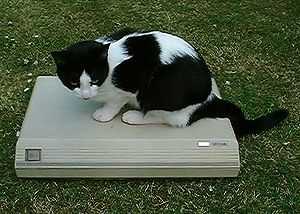DECtalk

DECtalk was a speech synthesizer and text-to-speech technology developed by Digital Equipment Corporation in the early 1980s, based largely on the work of Dennis Klatt at MIT, whose source-filter algorithm was variously known as KlattTalk or MITalk.[1]
The first DECtalk units were seen in 1984. They were standalone units that connected to any device with an asynchronous serial port. These units were also able to connect to the telephone system by having two telephone jacks. One connected to a phone line, the other to a telephone. The DECtalk units could recognize and generate any telephone touch tone. With that capability the units could be used to automate various telephone-related tasks by handling both incoming and outgoing calls. This included acting as an interface to an email system and the capability to function as an alerting system by utilizing the ability to place calls and interact via touch tones with the person answering the phone.
Later units were produced for PCs with ISA bus slots. In addition, various software implementations were produced, most notably the DECtalk Access32. Certain versions of the synthesizer were prone to undesirable characteristics. For example, the alveolar stops were often assimilated as sounding more like dental stops. Also, versions such as Access32 would produce faint electronic beeps at the end of phrases.
In the final years of DEC, early/mid-2000,[2] the DECtalk IP was sold to Force Computers, Inc. In December 2001, the IP was sold[3] from Force Computers, Inc, to Fonix Speech, Inc. (now SpeechFX, Inc.), which offers DECtalk as a small-footprint TTS system.[4]
The DECtalk engine was notably used in the National Weather Service's first "Console Replacement System" (CRS) installations in the late 1990s for NOAA Weather Radio. As of 2003 it had all but been replaced by a far more modern engine called Speechify. The so-called "Perfect Paul" voice (a DECtalk "preset" for a default understandable male voice) still does Station identifications on many NWR stations.[5]
DECtalk can be used as part of a speech generating device for those unable to speak. A notable user is Stephen Hawking, who is unable to speak due to a combination of severe disabilities caused by ALS as well as an emergency tracheotomy.[6] Hawking has used a version of the DECtalk voice synthesizer for several years[7] and has come to be associated with the unique voice of the device. In 2011, Hawking's research assistant Sam Blackburn said Hawking still used a version of DECtalk identified on its board as the "Calltext 5010" manufactured in 1988 by SpeechPlus, Inc.,[8] because he identified with it and had not heard a voice he likes better. The CallText 5010 is still listed on Hawking's site as of 2015.[9]
References
- ↑ Klatt, Dennis (April 1987), "How Klattalk became DECtalk: An Academic's Experiences in the Business World", The official proceedings of Speech Tech '87 (New York: Media Dimensions Inc./Penn State): 293–294
- ↑ "AllLinuxDevices: Force to Support Linux On DECtalk TTS For Strongarm and Intel Devices". Linux Today (Press release). 2000-10-26. Retrieved 2012-09-16.
- ↑ "Fonix acquires DECtalk from Force Computers". Deseret News. 2001-12-21. Retrieved 2012-09-16.
- ↑ "SpeechFX Text to Speech Solutions, FonixTalk, DecTalk". SpeechFX, Inc. Retrieved 2012-05-25.
- ↑ "NOAA Weather Radio Automated Voice and Programming". USA: NOAA. Archived from the original on 2013-01-14. Retrieved 2013-06-09.
- ↑ Hawking, Stephen. "Stephen Hawking and ALS". Retrieved 2009-08-10. (Originally published as: Hawking, Stephen. "Disability - my experience with ALS". hawking.org.uk. Archived from the original on 2000-06-14.)
- ↑ Greenemeier, Larry (2009-08-10). "Getting Back the Gift of Gab: NexGen Handheld Computers Allow the Mute to Converse". Scientific American. Retrieved 2009-08-10.
- ↑ Lange, Catherine de (2011-12-30). "The man who saves Stephen Hawking's voice". New Scientist. Retrieved 2013-06-09.
- ↑ Hawking, Stephen. "The Computer". hawking.org.uk. Retrieved 2015-03-01.
External links
- Klatt's Last Tapes - History of Speech Synthesis. BBC Radio 4 program (voice with slides). (see also: full transcript)
| ||||||||||||||||||||||||||||||